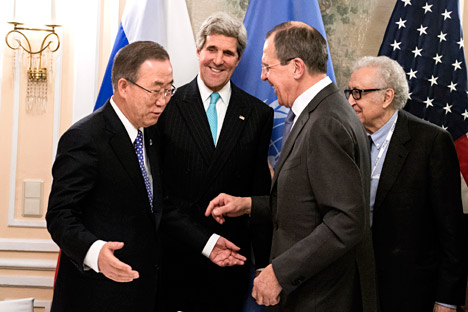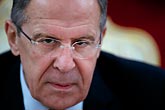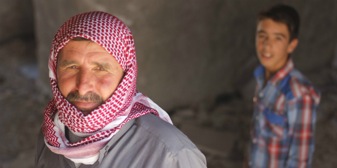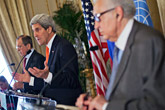Syrian crisis discussed at Munich security conference

Lavrov (second right) once again drew the Euro-Atlantic political elite’s attention to the fact that the prolonged conflict has turned Syria into a bastion of extremists and terrorists from all over the world. Source: AP
The conflict in Syria and the dramatic situation in Ukraine were at the top of agenda of the 50th Munich Security Conference. As soon as Russian Foreign Minister Sergey Lavrov arrived in the Bavarian capital late last Friday, he engaged in talks on the Syrian settlement. He first held a one-on-one meeting with U.S. State Secretary John Kerry; then the two were joined by UN Secretary-General Ban Ki-moon and special UN and Arab League representative Lakhdar Brahimi.
Brahimi had arrived in Munich from Geneva, where the first round of talks between the Syrian government and the opposition ended on January 31. The Algerian diplomat reported that the talks would resume on February 10, and expressed his hope that the second round would be more productive.
“No significant practical solutions have been identified at the talks so far - but there is no feeling of hopelessness, either,” a source in the Russian delegation to the UN and other international organizations in Geneva told RIR. Brahimi echoed that sentiment in Munich. “The gap between the positions of the two sides remains very wide," he said. “I was not expecting any immediate results. But the ice is breaking, albeit slowly. I hope that the second round will be more constructive and productive.”
In fact, some progress has been achieved on the issue of providing humanitarian assistance to the thousands of Palestinians living at the Yarmouk refugee camp in Damascus. The camp was set up well before the fighting broke out in Syria. Brahimi also said, however, that little has been done to bring relief to the people of Homs or facilitate an exchange of prisoners between the government and the rebels. “Differences between the two sides are very significant, and there is no point pretending otherwise,” the diplomat said.
The most contentious issue is the formation of a transitional governing body in Syria. Representatives of the National Coalition for the Syrian Revolutionary and Opposition Forces hoped to begin discussing the composition and the remit of that body on Thursday. The Syrian government’s delegation, however, insisted that fighting terrorism should be the top priority.
To prevent the talks from breaking down, Ban Ki-moon urged the two co-sponsors of the Geneva II conference, Russia and the United States, to become more involved in the proceedings. Kerry responded by saying that he is working with Lavrov in order to engage the Bashar Assad government in the peaceful settlement process. He said there were good reasons why Assad should be more interested in urgently taking part in the talks, but did not specify what those reasons were.
For his part, Lavrov recognized that Russia was coming under strong pressure to use its influence on Damascus. But Moscow cannot achieve any results on its own; those who support the Syrian opposition should also use their clout with the rebels. Lavrov reiterated that sentiment when he addressed the Munich Conference the following day. “Acting alone, Russia cannot achieve anything,” the minister said. “It is important that the external players should desist from trying to portray their ‘sponsored’ Syrian representatives as the only legitimate representatives of the Syrian people. They should put pressure on the Syrian factions to remain in Geneva and press ahead with the talks instead of slamming the door.”
The Russian foreign minister added that the dialogue in Geneva must be made genuinely representative as soon as possible. “Everyone who has influence on the opposition must make sure that all sections of Syrian society are represented at the negotiating table. That is a requirement outlined in UN Security Council Resolution 2118, which approves the June 30, 2012 Geneva Communiqué and supports the conference that aims to implement that communiqué.”
Lavrov once again drew the Euro-Atlantic political elite’s attention to the fact that the prolonged conflict has turned Syria into a bastion of extremists and terrorists from all over the world. Nobody knows how these people will apply the dangerous skills they have gained in Syria once they have returned home. “The outrages they are committing against Christians and other minorities in Middle Eastern countries give plenty of reasons to be very worried,” the minister said.
All rights reserved by Rossiyskaya Gazeta.
Subscribe
to our newsletter!
Get the week's best stories straight to your inbox


